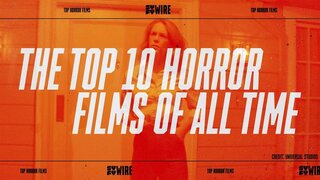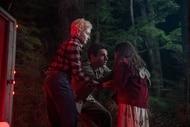Scott Derrickson's The Exorcism of Emily Rose Is a Spiritual Battle Full of Haunting Atmosphere
Let's look back at one of director's Scott Derrickson's early horror efforts.
I'm fascinated by movies that give us some measure of the ending right at the start of the story. I love the sense of inevitability it lends, particularly in horror, and I love watching the ways filmmakers still insert suspense, tension, and unpredictability into a narrative with a particular conclusion woven in from the opening frames. It's a very specific sort of narrative dance, and in the case of The Exorcism of Emily Rose, it's pulled off very well.
Directed and co-written by Scott Derrickson, who's since become horror royalty through titles like Sinister and The Black Phone, The Exorcism of Emily Rose (currently streaming on Peacock) opens with a key revelation: Emily Rose (Jennifer Carpenter) is dead. She didn't survive the exorcism of the title, and that means that priest who tried to save her, Father Moore (Tom Wilkinson), is on the hook for negligent homicide charges. As high-profile defense attorney Erin Bruner (Laura Linney) digs into the priest's case, she reveals to us as an audience that we're dealing with what seems like a binary choice: Do the facts of the case prove that Emily was indeed possessed, or do they prove that she was mentally ill and died because that mental illness wasn't properly treated?
Why Now Is a Great Time to Revisit The Exorcism of Emily Rose
The film is based on a real life exorcism case, that of a German woman named Anneliese Michel, but by changing the names and the setting, Derrickson is able to take the courtroom procedural nature of the true story and infuse it with all manner of spiritual questions and supernatural flourishes. We're shown the story from multiple points of view, revisiting things as Father Moore lived them, as Emily's family and friends lived them, and even as Emily herself says they happened. But perhaps most importantly, we're shown these things with a keen eye for context.
RELATED: 10 Terrifying Exorcism Movies to Watch After The Exorcist: Believer
Everything anyone else sees or hears Emily do can, according to the case's prosecutor (Campbell Scott), be explained away as something scientific, something "real." But when we go behind Emily's eyes and watch the world morph into something horrifying, as demonic faces appear in the eyes of her classmates and even in the heart of a thunderstorm overhead, we're asked to consider that perhaps these weren't simple hallucinations or embellishments. Perhaps Emily really was fighting a spiritual battle, and her story needs to be told to prove that battle was worth something.
That sense of spiritual weight is present throughout the entire film, but the real success story in The Exorcism of Emily Rose is, as you might expect, the horror elements. In Derrickson's version of the story, the possession and the demonic presences don't end with Emily. Instead, the entire narrative is infused with them, whether in Father Moore's meditations in prison or in Erin's daily life as she simply tries to push forward on the most difficult case of her professional life. It's here that Derrickson begins to reveal certain gifts that would blossom into masterpiece territory on Sinister a few years later. His knack for suspense is palpable, his sense of imagery already locked in, but perhaps most importantly, he knows how to play with the film's shadows.
You can't show an audience true darkness in a movie, at least not if you want them to see anything, and Derrickson has mastered the art of visible dark in his films. The nighttime scenes in The Exorcism of Emily Rose are instantly memorable because Derrickson's camera is constantly painting a shifting canvas of light and shadow, giving us a living, breathing darkness that hums all around the characters like another being in the frame, sometimes reaching out, sometimes pulling back, always there. It's a wonderful element in his horror films, and it's present in his early work as well as his later hits.
But the real secret weapon to the whole thing, of course, is Carpenter. Because the film hinges on the question of whether or not Emily was really possessed, and thus can't wield the kind of visual effects machinery of something like The Exorcist, much of the actual possession imagery falls to Carpenter herself to depict, from Emily's various contortions to the way her voice seems to roar like a living storm. She has to be vulnerable, monstrous, frightening, and fragile all at once, all while never diving into full-on levitations and pea soup vomit, and she does it all with a fearlessness and a power that has to be seen to be believed.
All of this adds up to a film that sustains itself and then some on the road to an end to Emily's story that we already know, but it's not just about her life or death. The Exorcism of Emily Rose succeeds because it's able to pour all of its considerable energy into reminding us that this is a story not just about a single incident, but about the ripple effects, both good and bad, of this particular spiritual fight. In that regard, it emerges as a showcase for everyone involved, and points the way to greatness for one of horror's biggest 21st century names.
The Exorcism of Emily Rose is now streaming on Peacock.











































